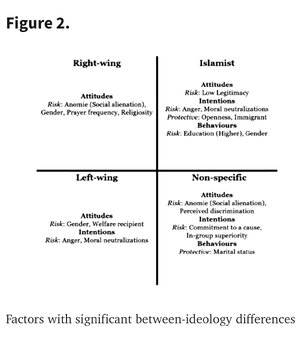How social exclusion makes radicalism flourish: A review of empirical evidence
“… Because an important part of radicalization is the desire to reach a specific goal, radical groups can be differentiated according to their main concerns: Extreme right-wing groups (e.g., the Ku Klux Klan) want to safe-guard the high status position of the “White race”; extreme left-wing groups (e.g., the Red Army Faction) want a more equal distribution of wealth; religiously motivated groups (e.g., the Islamic State) want to impose a strict interpretation of their religion; nationalistic groups (e.g., the Irish Republican Army) want to secure a territory; and single issue groups (e.g., the Animal Liberation Front) want one particular goal (e.g., animal protection) to be achieved (Doosje et al.,
2016). Members of these radical groups differ in some ways. For example, women are more involved in left-wing groups than in right-wing and religiously motivated groups, whereas the latter show more signs of mental illness (Chermak & Gruenewald,
2015). Despite these differences, radical groups share common elements, from perceiving serious problems in society to embracing an ideology that legitimizes violence to address their concerns (Doosje et al.,
2016). Furthermore, to understand the process of radicalization, it may be more informative to know
howradicalization happens rather than
who radicalizes (Horgan,
2008).
… One recent study combined previous findings on radicalization into a new model and tested it using a case study method in an Islamist sample (Pfundmair et al.,
2022). This model suggested that individual preconditions lay the groundwork for a gradual increase of individual processes (e.g., the psychological needs for significance and control), group processes (e.g., polarization and perceived group threat), and cognitive processes (e.g., desensitization and dehumanization) that result in violent attitudes, intentions, and ultimately, actions. The individual preconditions that promoted such processes included different biographical breaking points. Interestingly, one of those was social exclusion—being kept apart from others physically or emotionally (Riva & Eck,
2016).
This is consistent with the conclusions of experts on terrorism from other disciplines, such as political scientists, who argue that exclusion, or at least perceptions of exclusion, might be one condition that allows terrorism to flourish (e.g., Weight-Neville & Halafoff,
2010). Indeed, social exclusion is an event that has often been identified in the life of terrorists. For example, Anders Breivik, a right-wing terrorist who killed 77 people in Norway in 2011, was described as chronically excluded: “Whatever he tried in his life, he got rejected, rejected, rejected” (Graf,
2016, p. 1). For Foued Mohamed-Aggad—an Islamist terrorist who, together with two others, killed 90 people in Paris in 2015—rejection by the army and police was an important event in his life (Hughes,
2015). Based on these observations, the question arises what impact such exclusion experiences have on those who experience it.…”

